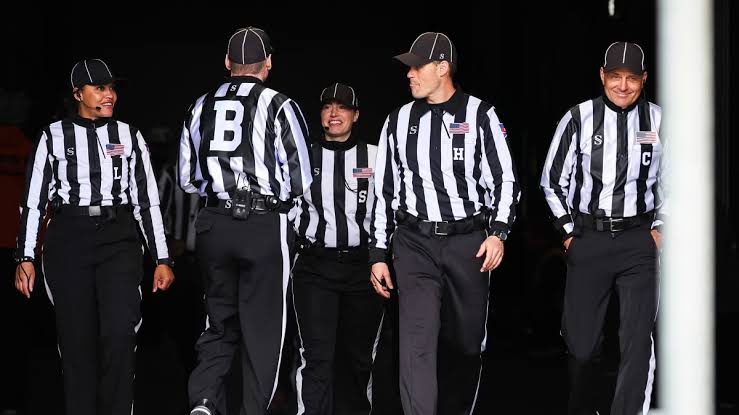
Report: NCAA finally Implement New Rule Change on How Officials Handle 12 Men on…….
In what could be a significant shift in how college football games are officiated, the NCAA is reportedly considering a rule change for how defenses with 12 men on the field will be handled. This comes amid growing concerns about game integrity, sportsmanship, and the overall fairness of competition. The move follows multiple instances in recent seasons where defenses intentionally left an extra player on the field to gain a tactical advantage, hoping to force a penalty but slow down the opposing offense in the process. Now, the NCAA is working to curb this practice by updating its officiating guidelines.
### Current Rule and the Loophole
Under the current NCAA football rules, having 12 men on the field results in a 5-yard penalty for the offending team. However, it has become a tactic for some defensive coordinators to instruct a player to stay on the field deliberately to disrupt fast-paced offenses, especially in no-huddle situations. Since the penalty is relatively minor compared to the potential advantage gained by stopping a play, teams have found a loophole. The offense gets penalized less in terms of game flow, with the defense benefitting from extra time to regroup and slow down the pace of play.
For example, in a no-huddle offense scenario, if the defense is scrambling to get set, having an extra defender on the field can confuse the offense or cause them to misalign. The ensuing penalty would only result in a short gain for the offense, but the defense benefits from the brief stoppage in play. This tactic, while effective in certain circumstances, has been criticized as unsportsmanlike and against the spirit of fair competition.
### Proposed Changes to the Rule
In response, the NCAA is looking to introduce a stricter version of the rule. According to early reports, the new regulation may penalize defenses more severely if they are caught with 12 men on the field in a non-accidental fashion. This could include stiffer penalties such as automatic first downs for the offense, or even allowing the offense to decline the penalty but keep the play running.
Another proposal being discussed is the potential for allowing the offense to snap the ball and play through, similar to how some offsides penalties are handled in the NFL. If implemented, this would mean that if a team snaps the ball while the defense has too many players on the field, the play could proceed with an automatic penalty being added to the end of the play if the offense gains yardage. This would essentially nullify the incentive for teams to leave an extra player on the field deliberately since the offense would still benefit regardless of the situation.
### Impact on Defensive Strategy
This rule change, if approved, could have a broad impact on defensive strategies across the NCAA. Defensive coordinators will need to ensure better communication and quicker substitutions to avoid giving away automatic first downs or giving offenses additional plays. For teams that rely heavily on complex defensive packages and frequent personnel changes, this adjustment could require more practice and precision in getting the right players on and off the field quickly.
Additionally, the proposed changes would likely favor fast-paced offenses even more. Teams that run a no-huddle, up-tempo offense, like those seen in the Big 12 or Pac-12, could see even more success as they put additional pressure on defenses to substitute quickly. Offenses that can keep defenses on their heels will be in an even stronger position if the new rules are implemented.
### Reactions from Coaches and Analysts
Early feedback from coaches and analysts suggests that while the change may be a welcome move to maintain fairness in the game, it could also present some challenges. Defensive-minded coaches, in particular, have expressed concerns about the potential for errors during substitutions being punished too harshly. College football is fast-paced, and sometimes players genuinely fail to get off the field in time without any intent to disrupt the game. These coaches argue that distinguishing between an accidental 12-man penalty and an intentional one could be difficult for officials to manage.
On the other hand, offensive coaches, particularly those who favor the no-huddle style of play, have been largely supportive of the change. Many argue that the game’s current structure unfairly penalizes teams that thrive on speed and tempo, and the rule change would restore balance.
### Conclusion
As the NCAA considers this rule change, the goal remains to preserve the integrity and spirit of the game. If approved, this rule could go into effect as early as the 2025 season. While it will likely have significant ramifications for defensive strategy, the overarching intent is to ensure a fair and competitive environment for both sides of the ball. Football purists will be watching closely to see how this potential change might shape the future of the sport at the college level.





